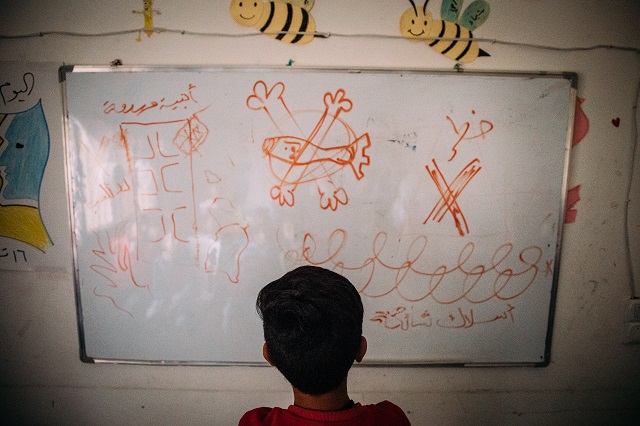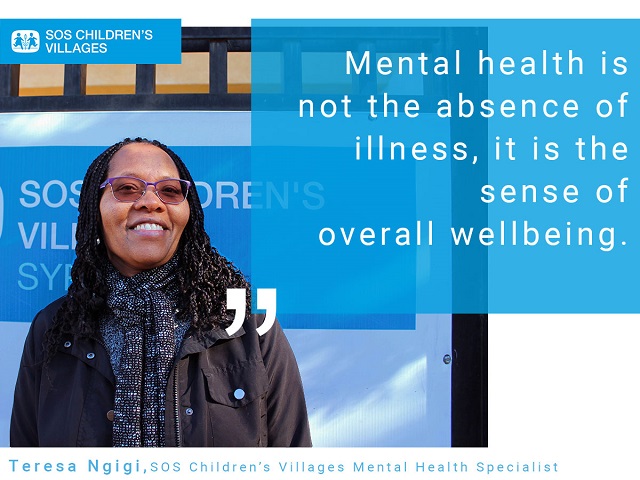COVID-19: Pay Attention to Children's Mental Health

By Teresa Ngigi
The second wave of coronavirus infections rising across Europe means we need to remember what we learned from the first: that living through a pandemic can be hard on the mental wellbeing of children.
As a child psychologist, I saw that those at greatest risks are those children who experienced some form of trauma earlier in life. The anxiety and isolation of these times can trigger their deepest fears.
Living through Italy’s lockdown showed me just how important it is for all parents and children to care for each other’s mental well-being.
At that time, my husband and I and our two teenagers – 16 and 14 – chose to set a routine, limit the amount of news we accessed, made time to reach out to friends and loved ones virtually, and created space to express our frustrations and anger.
But it is even more important for families with children who have gone through adverse negative experiences. I see this first-hand in my role as a mental health and psychosocial advisor for SOS Children’s Villages, where the majority of the children in our care have gone through some form of physical or emotional hardship.
For one boy, COVID-19 changed everything
In the early peak of COVID-19, a caregiver from Syria contacted me about a particular child whose story I knew well: the boy and his older brother were five and seven when they saw their father killed by a bomb that struck their home. Their mother was so shaken she locked herself and the children in a room in the remaining part of the house. She did not dare to leave. They stayed locked in there for a month and a half – no sunlight, only the sound of bombardment.
When the bombing stopped, the mother got the courage to come out. However, her distress and extreme paranoia left her unable to care for the boys properly. Local social welfare authorities intervened and placed the two children at the SOS Children’s Villages’ Interim Alternative Care Centre. However, when it came time to reunite with their mother, she was still not in the right state of mind, so the siblings moved to a family house at the SOS Children’s Village.
The children, feeling secure in this family-like environment, started thriving, going to school, and bonding with others. Then COVID-19 came and everything changed.

The younger brother seemed to cope better, but the older boy struggled. He relapsed into his earlier patterns of aggression. He could not stand still and was hyperactive. The pandemic interfered with his routine: no school, no sports, and scant interaction with others. The response to COVID-19 shook his foundation.
The SOS mother asked me, “What am I doing wrong?” She blamed herself, thinking she was not a good mother. When you, as an adult, have the sense that you are not good enough or capable, that, of course, affects the child you are taking care of. If a parent or caregiver is not healthy, it is difficult for the child to be healthy. Caregivers need support too.
Our intervention was to encourage psychologists and social workers to support the caregiver. The mother was disciplining the child because she felt he was misbehaving. We had to change that attitude since it is not that the child is misbehaving, it is that they are going through a re-enactment, reliving a trauma that has not been resolved. By working with the mother and involving her to be able to identify the challenges, it became easier for her to re-establish the bond with the child. The process continues but the situation is much better because the child does not feel judged, but rather supported.
The boy, now eight, is better able to express himself. We encouraged and empowered him to speak up by asking him, ‘What are you feeling? Can you put it in a drawing? Are there activities that will help you get those emotions out?’ The young boy has a wonderful voice. We asked ourselves, ‘Why don’t we build on this? This is a talent that this child has that would help him to express himself.’ He now sings and performs in front of others and is doing much better now.
Be mobilized, not paralyzed
I urge all parents and caregivers to pay attention to early warning signs in their children. When you notice behavioral changes, from aggression to withdrawal, do not ignore it. Taking care of our child’s mental health, like their physical health, is an integral part of parenting. Remember, mental health is not the absence of illness, it is the sense of overall wellbeing where a person thrives in their life and they are able to function properly. When people look at mental health as part of human development then our stigma to seek help will no longer be there. We need to include a mental health approach in whatever we are doing and not wait for disaster to happen to intervene and do damage control.
It is important to remember that children are very resilient. They have many internal resources they can tap into as well. All children, whether those who experienced war in Syria, inhumane conditions in refugee camps, or violence and abuse in families in our own communities, have an inner power that needs to be recognized, nurtured, and cultivated. The young boy from Syria learned that singing was a way to express himself. For others, play, art or drama can serve as an outlet to work through trauma and negative experience. We need to intervene early and provide them with tools to manage their own emotions so that when challenges occur, they know how to deal with them in a healthy manner. When they face challenges in the future, they will remember ‘I was able to do this once before, I can do it again’.
With COVID-19 still alive and well globally, it is crucial to develop more protective factors for children, youth, and adults, in order not to be paralyzed by its effects. We choose to be mobilized, not paralyzed. As the eye of the hurricane, we can have that inner strength that is unshaken, despite the surrounding turmoil. The experience of change can strengthen us and inspire us to put first things first.

Teresa Ngigi, an expert and author in the field of childhood trauma, supports the mental health of children and caregivers at SOS Children’s Villages, particularly in those countries with a history of civil war and conflict.
Canadians wishing to help vulnerable children are encouraged to sponsor a child, sponsor a Village or make a Donation today to our COVID-19 response.
